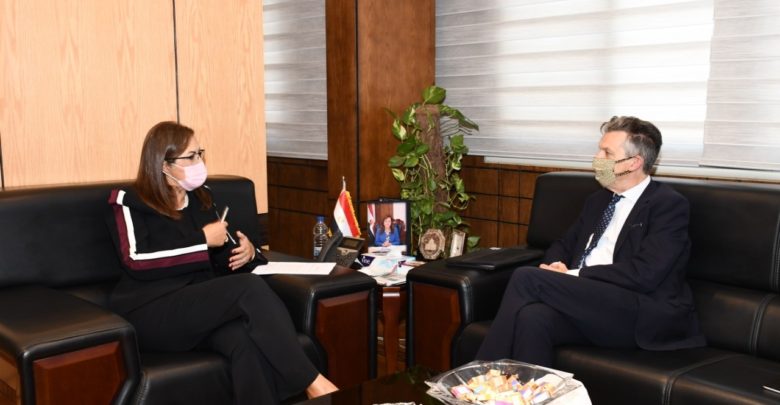
Ashraf AboArafe
Dr. Hala Al-Saeed:The Egyptian government adopted a proactive strategy to confront the Coronavirus very early and took all necessary measures to mitigate the negative effects of the crisis on the most vulnerable segments of the population.
– The Egyptian government continues to increase public investments to implement new projects and provide better services
Sir Geoffrey Adams: “I was delighted to meet Minister of Planning Dr Hala El Said, to discuss UK-Egypt partnership in the field of economic development. The UK is committed to deepening that partnership, as Egypt moves ahead with its economic reform programme.”
20 October 2020, CAIRO – Dr. Hala Al-Saeed, Minister of Planning and Economic Development met with the British Ambassador to Egypt Sir Geoffrey Adams, to discuss UK-Egypt economic cooperation during the shared fight against Covid-19 and routes toward a green recovery.
Dr. Hala Al-Saeed, Minister of Planning and Economic Development, said that the economic and social reform program that was implemented in 2016 contributed to improving indicators and strengthened resilience, noting that these reforms would lead to macroeconomic stability, inclusiveness and sustainable growth.
Al-Saeed pointed to investing heavily in developing the infrastructure in order to enhance the competitiveness of the Egyptian economy and place it on the investment map, stressing that this successful economic program, which was praised by all international institutions, has effectively contributed to improving all economic indicators and strengthening the resilience of the Egyptian economy.
Al-Saeed pointed out that the Egyptian government adopted a proactive strategy very early, as it took all necessary measures to mitigate the negative effects of the crisis on the most vulnerable segments of the population, as the main objectives were to contain the spread of the virus without imposing a complete closure, and to support economic activity through sector-specific measures, together with worker support, ensuring income stability, closely monitoring developments related to the crisis and updating forecasts accordingly.
Al-Saeed said that since February 24 until now, the Egyptian government has issued more than 380 policies implemented by 70 institutions targeting all social groups and sectors, confirming Egypt’s endeavour to support sectors that have witnessed negative effects of partial closure measures, to include these sectors: tourism, aviation, small and medium enterprises, and agriculture.
Al-Saeed added that some of the policies adopted by the state focused on supporting economic activity with the aim of boosting domestic demand, especially since it is the first time that a shock affects the supply and demand side at the same time, adding that support for informal workers was also central to the Egyptian state’s strategy, as the state disbursed a cash grant and established a database for these workers to enable them to find decent jobs.
With regard to the monetary measures taken by the Central Bank to help the recovery, Al-Saeed explained that these measures included lowering interest rates, postponing credit entitlements and repaying loans to the tourism sectors and small and medium-sized companies.
On the fiscal year 2020/2021 plan, Al-Saeed indicated that the Egyptian government continues to increase public investments to implement new projects and provide better services, stressing that the Covid-19 pandemic prompted the Egyptian state to rearrange its priorities, which led to an increased focus on specific sectors and activities such as health, digitization, infrastructure, agriculture, industrialization and the green economy. She addedthat the plan focuses on ensuring that compatibility with the principles of the green economy in national investment projects reaches 30% and then 100% over the next three years, in a manner that ensures sustainable development, and attaches great importance to recycling and waste management in order to mitigate harmful environmental impacts.
From his side, the British Ambassador praised Egypt’s efforts in building a greener economy, especially after its successful first sovereign green bonds issuance on the London Stock Exchange. The UK and Egypt have been working together to tackle climate change and will continue to intensify climate collaboration leading up to United Nations Climate Change Conference (COP26), to be hosted in the United Kingdom next year.
Both parties also addressed Egypt’s economic and investment plans, noting also the recent appointment of Sherine Shohdy as the first country director of CDC Group to be based in Egypt. CDC is the UK’s development finance institution, and has previously invested in Egypt’s and Africa’s biggest solar park, Benban, and provided US$100 million of Tier 2 capital to the Commercial International Bank (Egypt). Dr El Said and Sir Geoffrey welcomed the potential for further UK-Egypt partnership and engagement in the investment sector, particularly on green projects.
The British Ambassador to Egypt,Sir Geoffrey Adams said: “I was delighted to meet Minister of Planning Dr Hala El Said, to discuss UK-Egypt partnership in the field of economic development. The UK is committed to deepening that partnership, as Egypt moves ahead with its economic reform programme.”




